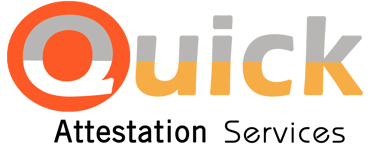Simplifying Document Attestation Process & Types
Discover everything you need to know about document attestation, including the attestation process, various types of attestation, and essential requirements to ensure your documents are properly validated.
10/15/20257 min read


Introduction to Document Attestation
Document attestation refers to the official verification process undertaken to confirm the authenticity of various types of documents. This procedure holds significant importance across multiple sectors, including legal, educational, and immigration. In an increasingly globalized world, the need for document attestation has become paramount, facilitating international acceptance and ensuring that documents are recognized in foreign jurisdictions.
Essentially, document attestation serves as a safeguard against fraud, providing assurance to governments, educational institutions, and employers that the documents presented are legitimate. For instance, in the domain of education, universities and colleges often require that academic certificates undergo attestation to validate their authenticity before enrollment or admission. Similarly, in legal contexts, attested documents hold more weight and credibility in court proceedings and during contractual agreements.
The immigration process is perhaps one of the most critical areas where document attestation is indispensable. When individuals seek to migrate to another country, they must present a plethora of documents, including birth certificates, marriage licenses, and educational transcripts. These documents must be attested to prove their validity, as embassies and consulates require this step to prevent fraudulent claims and ensure that the provided information is accurate. Without proper attestation, applications may be delayed or, in some cases, entirely rejected.
As we delve deeper into the nuances of document attestation, including various types, the steps involved in the process, and specific requirements, it becomes evident that understanding this subject is crucial for anyone navigating international systems. Ensuring that documents are adequately attested plays a vital role in facilitating smoother interactions across borders and protecting individual interests.
Different Types of Document Attestation
Document attestation is a crucial process that allows for the validation of various types of documents, ensuring they are recognized as authentic and credible across different jurisdictions. Attestations can be broadly categorized into three main types: personal documents, educational documents, and commercial documents. Each category serves distinct purposes and is typically required under various circumstances.
Personal Documents: This category includes essential certificates such as birth certificates, marriage certificates, and divorce decrees. Personal document attestation is often necessary for international relocation, visa applications, or civil status verification. For instance, when an individual applies for a visa to migrate to another country, the host nation's immigration authority may require attestation of the applicant's birth and marriage certificates to establish identity and family relationships. Furthermore, the attestation proves that the documents are legally recognized and can be used in legal matters.
Educational Documents: These documents include degrees, diplomas, and academic transcripts, which are vital for individuals seeking employment or further education abroad. Educational document attestation is crucial for validating the authenticity of qualifications obtained from educational institutions. For example, a university graduate planning to study in a foreign country may need to present attested transcripts and degrees to fulfill admission requirements. Additionally, employers may request attestation of educational documents during the hiring process, as it confirms the candidate's qualifications and educational background.
Commercial Documents: This type encompasses business-related documents such as invoices, contracts, and company registrations. Commercial document attestation is necessary for international trade, ensuring that businesses adhere to legal regulations and standards. For instance, companies involved in importing or exporting goods may require attestation of invoices and contracts to verify authenticity and mitigate the risk of fraud. These documents serve as proof of transactions and are critical in disputes or negotiations between parties.
Each type of document attestation is essential in facilitating various personal, educational, and commercial dealings, ensuring the required validations are observed for legitimacy and recognition in different contexts.
The Document Attestation Process
Document attestation is a vital step required for validating the authenticity of various documents for legal or official purposes. The process typically begins with preliminary checks, wherein individuals must ensure that their documents meet specific authenticity criteria. This may include verifying the origin of the document, its type, and the issuing authority. Confirming these details early on can streamline the entire attestation process.
Once preliminary checks are complete, the next step usually involves notarization. A notary public plays a crucial role in this phase, as they certify the authenticity of the signatures on the document. Notarization must be accurately completed, as it adds a layer of legitimacy that is often required by subsequent attesting bodies.
Following notarization, the document typically must be presented to relevant authorities for further attestation. This may include submission to the Ministry of External Affairs or other local regulatory bodies, depending on the nature and destination of the document. If the document is intended for use in a foreign country, it may also require authentication from the respective embassy or consulate. Each authority will often have unique requirements and processing times, influencing the timeline for the entire attestation process.
Understanding the specific requirements laid out by each authority can help applicants avoid common pitfalls, such as submitting incomplete documents or failing to meet specific formatting standards. The average timeline for document attestation can vary widely, from a few days to several weeks, depending on the complexity of the case and the efficiency of the involved authorities. Applicants should plan accordingly to ensure a timely completion of the attestation process.
Requirements for Document Attestation
Document attestation is a crucial process that ensures the authenticity and legitimacy of various documents. To successfully undergo attestation, certain requirements must be met, and the necessary documentation must be prepared. The process typically entails providing original documents accompanied by clear photocopies. Original documents are mandatory as they serve as the primary source of validation, while photocopies ensure that there is a reliable backup should any issues arise during the attestation process.
Identification proofs are another critical requirement for document attestation. This can include a government-issued photo ID, such as a passport, driver's license, or national identification card. Such identification establishes a direct correlation between the individual and the documents submitted for attestation. It is essential to ensure that the identification proofs are valid and clearly legible to avoid any delays in the process.
Additionally, different types of documents may have varying requirements. For example, educational certificates may necessitate verification from the issuing educational institution, whereas personal documents like birth or marriage certificates may require notarization. Depending on the country where the attestation is being carried out, specific additional paperwork may also be needed. This could include forms of consent, proof of residency, or any relevant legal documentation.
It is advisable to consult with the relevant authorities or professional services specializing in document attestation to obtain precise information tailored to your situation. Various countries may have distinct guidelines on the documents they acknowledge for attestation purposes. Meeting these requirements not only expedites the process but also minimizes potential complications, thereby facilitating a smoother experience in obtaining official recognition of the documents.
Challenges in the Document Attestation Process
Document attestation is a critical procedure often required for various legal and professional purposes. However, this process is fraught with challenges that can complicate and delay the outcome. One of the predominant issues faced is the language barrier. Many countries require documents to be submitted in a specific language, which may not be the native language of the individual seeking attestation. This necessitates the need for certified translations, which can add to both time and costs. It is essential to ensure that translators are recognized by relevant authorities to avoid further complications.
Another significant challenge is the prevalence of fraudulent documents. In today's world, the existence of forged documents can pose a severe risk to the integrity of the attestation process. Authorities worldwide are becoming increasingly vigilant in verifying the authenticity of documents submitted for attestation. As a result, individuals must exercise due diligence and ensure that all documents are legitimate and properly sourced. This often includes obtaining the necessary clearances and verifying the legitimacy of degrees or certificates through relevant educational or governmental bodies.
Additionally, differing international regulations present another obstacle. Each country has unique requirements, which can include specific documents, procedures, and timelines. These discrepancies can lead to confusion and delays, particularly for those navigating the attestation process for the first time. Individuals are advised to thoroughly research the regulations of the country in which they wish to have their documents attested. This preparation can help in identifying and addressing any country-specific requirements upfront, ensuring a smoother attestation experience.
By being aware of these challenges and taking proactive steps to address them, individuals can significantly improve their chances of navigating the document attestation process efficiently.
Tips for a Smooth Document Attestation Experience
Navigating the intricacies of document attestation can be a daunting task for both individuals and businesses. To simplify this process and ensure a successful outcome, it is essential to adopt a strategic approach. Preparation is paramount; prior to initiating the attestation, ensure that all pertinent documents are organized and complete. This entails gathering original documents along with necessary copies, which may include identification, proof of address, and any specific papers required by the destination country or institution.
Choosing the right service providers is another critical step in achieving a seamless attestation experience. Research various attestation agents and services available, focusing on their credentials, reviews, and success rates. Opt for providers with a solid reputation and experience in handling the specific type of documents you wish to attest. Their expertise will greatly influence the efficiency and accuracy of the process. Moreover, inquire about their fees upfront and ensure there are no hidden charges, as this will help avoid unexpected expenses down the line.
Understanding timelines is equally important. Each attestation process has its own timeframe, which can vary depending on the types of documents, the authorities involved, and the service provider’s efficiency. To avoid potential delays, inquire about the typical processing times and plan your submission accordingly. When dealing with time-sensitive documents, start the attestation process well in advance to accommodate any unforeseen delays.
By following these tips, individuals and businesses can empower themselves in the document attestation journey. A well-prepared approach combined with the right service provider and a clear understanding of timelines will help streamline the entire process, ensuring that your attestation needs are met efficiently.
Conclusion: The Importance of Understanding Document Attestation
In a world that is increasingly interconnected, the process of document attestation has emerged as a crucial requirement for individuals and businesses alike. Understanding the intricate steps involved in document attestation can facilitate smoother transitions across borders, ensuring that important records hold validity in foreign legal systems. This not only applies to personal documents like marriage certificates and birth certificates but also extends to business documents, which are essential for commercial engagements and international trade.
Throughout the discussion, we have highlighted various types of document attestation, including educational, commercial, and personal attestations. Each category comes with its own specific requirements and processes, depending on the country in which the attestation takes place. This variety underscores the significance of being well-informed about the requirements particular to each document type, as neglecting these can lead to delays or even rejection of applications in critical legal or professional contexts.
Moreover, being proactive in understanding document attestation can empower individuals and organizations to avoid potential legal challenges or disputes that may arise from unverified documents. The ramifications of improperly attested documents can be severe, affecting everything from employment opportunities to the legitimacy of business contracts. Hence, appreciating the importance of proper document attestation not only protects one’s interests but also helps foster trust in professional relationships.
In conclusion, as globalization continues to shape our interactions, the necessity for properly attested documents has never been more apparent. By equipping themselves with knowledge about the document attestation process, individuals and organizations can navigate their legal obligations with confidence, ensuring smooth and successful engagements in a globalized marketplace.
Expert
Your trusted partner for document attestation services.
Contact NOw:
Support
+91 9210776391
© 2025. All rights reserved.
